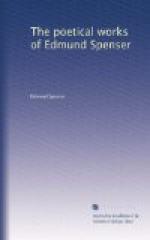None thereof worthy be, but those whom shee
Vouchsafeth to her presence to receave,
And letteth them her lovely face to see,
255
Wherof such wondrous pleasures they conceave,
And sweete contentment, that it doth bereave
Their soul of sense, through infinite delight,
And them transport from flesh into the spright.
In which they see such admirable things,
260
As carries them into an extasy;
And heare such heavenly notes and carolings
Of Gods high praise, that filles the brasen sky;
And feele such ioy and pleasure inwardly,
That maketh them all worldly cares forget,
265
And onely thinke on that before them set.
Ne from thenceforth doth any fleshly sense,
Or idle thought of earthly things, remaine;
But all that earst seemd sweet seemes now offence,
And all that pleased earst now seemes to paine:
270
Their ioy, their comfort, their desire, their game,
Is fixed all on that which now they see;
All other sights but fayned shadowes bee.
And that faire lampe which useth to enflame
The hearts of men with selfe-consuming fyre,
275
Thenceforth seemes fowle, and full of sinfull blame
And all that pompe to which proud minds aspyre
By name of Honor, and so much desyre,
Seemes to them basenesse, and all riches drosse,
And all mirth sadnesse, and all lucre losse.
280
So full their eyes are of that glorious sight,
And senses fraught with such satietie.
That in nought else on earth they can delight,
But in th’aspect of that felicitie
Which they have written in theyr inward ey;
285
On which they feed, and in theyr fastened mynd
All happie ioy and full contentment fynd.
Ah, then, my hungry soule! which long hast fed
On idle fancies of thy foolish thought,
And, with false Beauties flattring bait misled,
290
Hast after vaine deceiptfull shadowes sought,
Which all are fled, and now have left thee nought
But late repentance, through thy follies prief,
Ah! ceasse to gaze on matter of thy grief:
And looke at last up to that Soveraine Light,
295
From whose pure beams al perfect Beauty springs,
That kindleth love in every godly spright,
Even the love of God; which loathing brings
Of this vile world and these gay-seeming things;
With whose sweet pleasures being so possest,
300
Thy straying thoughts henceforth for ever rest.
* * * * *
EPIGRAMS AND SONNETS.
EPIGRAMS.
I*. [* In the folio of 1611, these four short pieces are appended to the Sonnets. The second and third are translated from Marot’s Epigrams, Liv. III. No. 5, De Diane, and No. 24, De Cupido et de sa Dame. C.]




